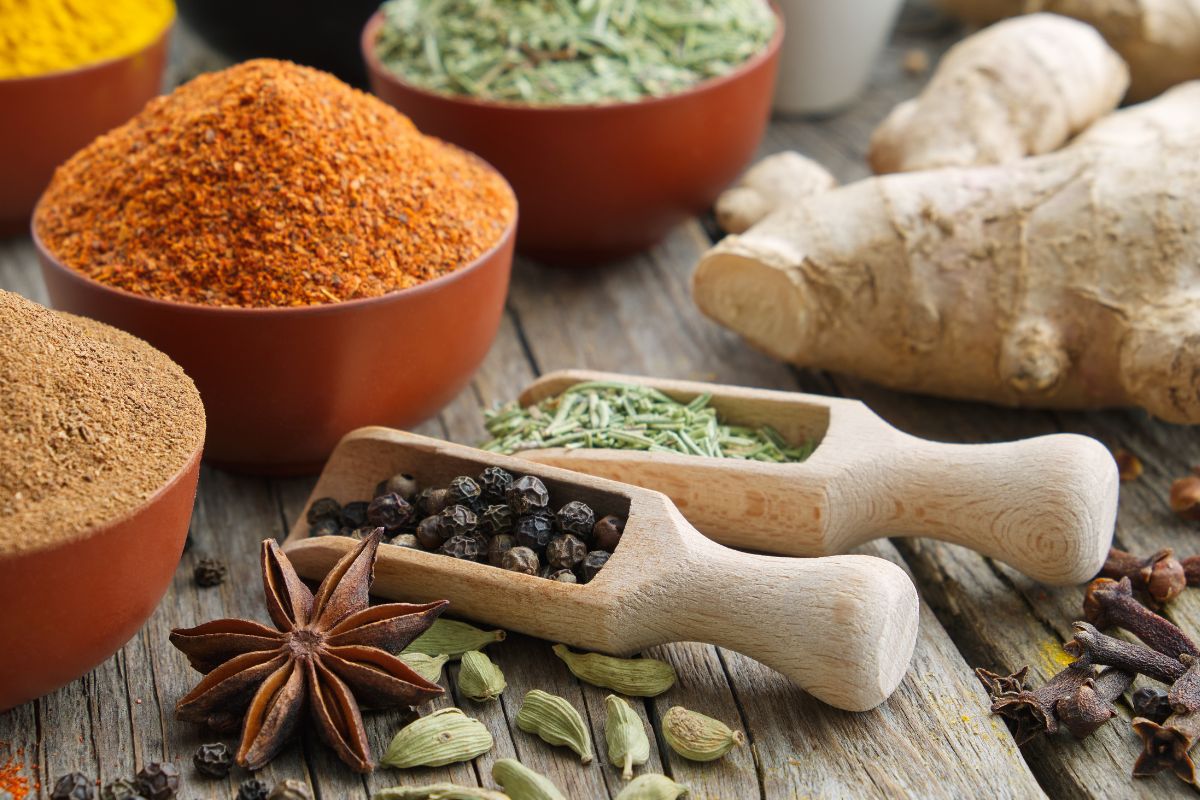Have you ever stopped to think about how wise nature is? Long before modern medicine existed, people were already using plants to treat infections, relieve pain, and take care of their health on a daily basis. What many folks don’t realize is that several of these plants contain substances that fight bacteria naturally — these are the famous medicinal herbs with antibacterial properties. They not only help prevent infections but can also be great allies in strengthening our immune system.
Nowadays, with the growing issue of resistance to conventional antibiotics, this ancestral wisdom is making a strong comeback. Let’s face it: overusing medications can lead to side effects and even reduce their effectiveness over time. That’s why more and more people are turning to natural alternatives to support their healthcare routines — and antibacterial herbs fit perfectly as a powerful and accessible option, often already sitting in our kitchen.
Of course, we’re not talking about replacing medical treatments here, okay? But adding to them. Using these herbs regularly can be a smart way to prevent problems or ease mild symptoms naturally and safely. In this article, I’ll introduce you to the top 10 medicinal herbs with antibacterial properties you need to know. The best part? They’re easy to use, packed with benefits, and carry fascinating stories of traditional use from around the world.
🦠 Why Worry About Bacteria?
Bacteria are a part of life — and to be fair, not all of them are bad. Our bodies host trillions of them, especially in our gut, where they help with digestion and even vitamin production. The problem starts when the “bad guys” show up. Harmful bacteria can cause throat infections, skin issues, respiratory problems, and more — and that’s when we need to stay alert.
For decades, antibiotics have been the heroes of this story. They’ve saved millions of lives by treating serious infections. But over time, their overuse (and misuse) has brought a new challenge: antibiotic resistance. This means some bacteria have learned how to “dodge” the effects of antibiotics and continue causing infections, even when you’re taking the right medication. Scary, right?
What’s even more alarming is that this isn’t some far-off problem — it’s already happening. Some people need to try several antibiotics before finding one that works, and in some extreme cases, nothing does. Experts are raising the alarm: we need to use antibiotics more responsibly and explore complementary ways to stay healthy and fight off infections.
And that’s exactly where medicinal herbs with antibacterial properties come in. They don’t replace traditional medicine, but they can be amazing natural allies — especially for mild issues like a sore throat, a small skin cut, or just giving your immune system a little boost. The best part? They’re natural, easy to find, and may already be part of your everyday routine.
🌱 1. Garlic – The Immune System Warrior
Garlic is one of those ingredients almost everyone has at home, right? But it’s much more than just a flavor booster. This little bulb is a natural powerhouse when it comes to health. Its main active compound, allicin, is released when garlic is crushed or chopped and has been shown to fight off several bacteria, like E. coli and Staphylococcus aureus. It also has antifungal and antiviral properties, making it a true natural “multi-tool.” No wonder it’s been used for thousands of years in different cultures to treat colds, respiratory infections, sore throats, and even support heart health.
Personally, when I feel a scratch in my throat, I crush a clove of garlic and mix it with honey. Strong? Yes. Effective? Absolutely. You can also add it to ginger tea with lemon, or just cook with more garlic throughout the day. Just don’t overdo it — too much raw garlic can irritate the stomach. A useful tip: after chopping the garlic, wait a few minutes before cooking it. This helps activate even more allicin and boosts its antibacterial power.
🌿 2. Oregano – So Much More Than a Pizza Topping
Let’s be honest — when you think of oregano, pizza probably comes to mind, right? But this humble herb is actually one of the most powerful medicinal herbs with antibacterial properties. The magic lies in a compound called carvacrol, found mostly in the essential oil. Studies show it can fight off a range of bacteria, including stubborn ones like Pseudomonas aeruginosa and Staphylococcus aureus. Oregano is also anti-inflammatory, antifungal, and packed with antioxidants.
Whenever I feel a little under the weather, I brew some oregano tea with lemon — it might sound weird, but it works wonders. You can also use oregano essential oil for a more concentrated effect, just be sure to dilute it well. It’s great for small skin infections or as a natural defense against bacteria. This little herb does way more than season your food — it’s a quiet warrior for your health.
🍵 3. Thyme – A Healthy Breath of Fresh Air
Thyme may seem unassuming, but it’s a gem when it comes to medicinal herbs with antibacterial properties. Its star compound, thymol, has strong antimicrobial effects and is particularly useful for respiratory and digestive infections. It helps with bronchitis, sore throats, and persistent coughs, and even acts as a mild expectorant. For centuries, thyme tea has been used to relieve chest congestion and soothe sore throats — and science backs it up.
I turn to thyme whenever I feel tightness in my chest. I make an infusion with dried leaves, add honey and lemon, and sip it slowly. I’ve even used thyme tea for steam inhalation, and it really helps loosen mucus. Thyme essential oil can also be used as a natural antiseptic in vaporizers or diluted on the skin — just be gentle with it. Whether in a cup or a diffuser, thyme is the kind of herb that takes care of you without making a fuss.
🌼 4. Rosemary – Energy and Protection
Rosemary is the herb of memory, energy, and joy — and yes, it also has powerful antibacterial properties. Thanks to compounds like rosmarinic acid and cineole, rosemary fights a variety of bacteria and even helps reduce inflammation. It’s great for skin infections, respiratory issues, and can even speed up wound healing.
I always say rosemary feels like a boost of good vibes. When I need to focus, I brew a rosemary tea — it’s like flipping the switch to “alert mode.” I’ve also used it as a compress on small cuts and saw real improvement. You can even make a rosemary hair tonic! Just don’t go overboard, as too much of anything isn’t good. But with balance, rosemary is a refreshing, healing force in herb form.
🐝 5. Propolis – Nature’s Bee Shield
Propolis is one of those natural wonders that gets more impressive the more you learn about it. Made by bees from plant resins, it protects the hive from bacteria, fungi, and viruses — basically a natural shield. And it’s not just for bees: research shows that propolis has strong antibacterial properties, especially against bacteria that affect the throat, mouth, and skin. The famous green Brazilian propolis is even gaining global scientific attention.
Growing up, my mom always gave me a few drops of propolis in water when I had a sore throat — and it worked like a charm. Now, I keep a small bottle nearby, especially during colder months. I use it for gargling or mix it with lemon and honey when I feel a cold coming. Just be careful — since propolis is super concentrated, it can trigger allergic reactions in some people, especially those sensitive to bee products. Start slow and see how your body reacts.
🌶️ 6. Ginger – Spicy and Strong
Ginger brings the heat — literally. That spicy kick comes with antibacterial, anti-inflammatory, and immune-boosting powers, thanks to compounds like gingerol and shogaol. It’s one of the most versatile herbs around and works wonders for throat infections, respiratory issues, and digestive problems.
Whenever I feel a cold creeping in, I make ginger tea with lemon and honey. It warms the body and clears things up quickly. I’ve also grated fresh ginger into orange juice — it’s intense, but incredibly revitalizing. You can add it to soups, stir-fries, or even chew on a small piece (if you’re brave!). Just keep in mind it’s strong — too much can irritate the stomach.
✨ 7. Turmeric – The Golden Root of Health
Turmeric, also known as golden root, is pure sunshine in a spice. Its main compound, curcumin, gives it strong antibacterial, anti-inflammatory, and antioxidant properties. It helps your body fight infections from within and boosts overall immune function. Turmeric is also great for joint pain, digestion, and even liver health.
I always keep turmeric powder on hand. I sprinkle it into rice, soups, or make the famous “golden milk” with turmeric, cinnamon, and honey — it’s a magical bedtime drink. I’ve even used turmeric and honey paste on breakouts — it works! Just be careful: turmeric stains everything it touches. But other than that, it’s gold in every sense of the word.
🍃 8. Peppermint – Refreshing and Effective
Peppermint is the plant that hits you with that instantly fresh scent. It contains menthol and menthone, which don’t just cool you down — they also fight bacteria, especially those in the mouth, respiratory system, and even the gut. It’s a fantastic ally for bad breath, sore throats, and headaches.
I’ve chewed peppermint straight from the garden when my gums felt sore, and it worked like a charm. I also make a simple peppermint tea to calm my stomach or clear my sinuses. In summer, I freeze mint and lemon in ice cubes — tasty and good for you! Just remember that peppermint oil is strong, so always dilute it before using it on your skin.
🌿 9. Sage – Ancient Herbal Wisdom
Sage is an herb loaded with tradition. Its name comes from salvare, which means “to heal” — and it definitely lives up to it. Among the medicinal herbs with antibacterial properties, sage stands out for treating oral and throat infections. Its essential oil and leaves contain thujone, camphor, and rosmarinic acid, which help reduce inflammation and kill bacteria.
Once, before a big presentation, I woke up with a sore throat. I made a sage tea with honey, like my grandma used to recommend, and it saved the day. You can gargle it or drink it for digestive relief. Just don’t overdo it — too much sage can be toxic because of the thujone. But used with care, it’s herbal wisdom in a cup.
🍂 10. Cinnamon – Sweet and Deadly (for Bacteria)
Cinnamon might smell like cozy desserts, but it’s no joke when it comes to fighting bacteria. The compound cinnamaldehyde gives it strong antibacterial effects, especially against bacteria in the mouth, respiratory system, and even foodborne bugs. It’s also antifungal and packed with antioxidants.
I use cinnamon in so many ways — in tea with ginger and clove during cold days, or a pinch in warm milk with honey before bed. It comforts the soul and keeps bacteria in check. Just go easy: too much cinnamon can be irritating or harmful to the liver. Used wisely, though, it’s that sweet touch with a powerful punch.
Nature truly knows what it’s doing, doesn’t it? These medicinal herbs with antibacterial properties are more than just ingredients — they’re time-tested allies that have supported human health for generations. From the kitchen to the teacup, they offer gentle, effective ways to care for your body, prevent minor infections, and give your immune system that extra bit of love it deserves.
Of course, these herbs aren’t magic bullets — and they’re not meant to replace proper medical care when things get serious. But as part of your everyday wellness routine? They can make a real difference. The best part is that many of them are easy to find, easy to use, and full of benefits far beyond what we often give them credit for.
So, which of these herbs do you already use? Got a grandma’s recipe that never fails? Share it with us in the comments! And if this article helped you see your spice rack in a whole new light, send it to a friend or loved one. After all, natural health is even better when shared.
Further Reading – Want to Dive Deeper?
If you’re curious to explore even more about the health benefits of herbs and spices, check out this excellent article by Medical News Today. It’s packed with useful information and science-backed insights on natural healing:
👉 Healthy Herbs and Spices – Medical News Today

Sam Bright is a passionate researcher of the power of medicinal plants and their benefits for health and well-being. With years of study and practice in the use of therapeutic herbs, he is dedicated to sharing accessible, evidence-based knowledge on how nature can support health holistically.
Through his blog, Sam explores everything from the traditional uses of plants to modern scientific discoveries, always with a practical and informative approach. His goal is to help people integrate herbal medicine into their daily lives in a safe and effective way.

